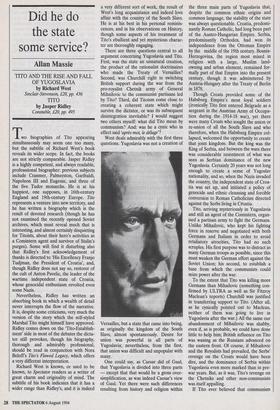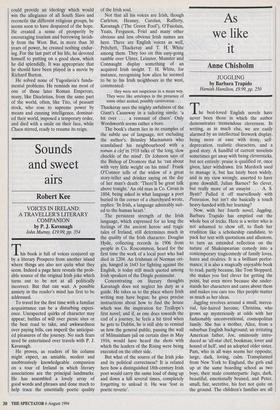Did he do the state some service?
Allan Massie
TITO AND THE RISE AND FALL OF YUGOSLAVIA by Richard West Sinclair-Stevenson, £20, pp. 436 TITO by Jasper Ridley Constable, £20, pp. 495 Two biographies of Tito appearing simultaneously may seem one too many, but the subtitle of Richard West's book reveals its wider scope. In fact, the books are not strictly comparable. Jasper Ridley is a highly competent, and always readable, professsional biographer: previous subjects include Cramer, Palmerston, Garibaldi, Napoleon III and Eugenie, and three of the five Tudor monarchs. He is at his happiest, one supposes, in 16th-century England and 19th-century Europe. Tito represents a venture into new territory, and he has written a biography which is the result of devoted research (though he has not examined the recently opened Soviet archives, which must reveal much that is interesting, and almost certainly disquieting for Titoists, about their hero's activities as a Comintern agent and survivor of Stalin's purges). Some will fmd it disturbing also that Ridley's first acknowledgement of thanks is directed to 'His Excellency Franjo Tudjman, the President of Croatia', and, though Ridley does not say so, restorer of the cult of Anton Pavelic, the leader of the wartime independent state of Croatia, whose genocidal enthusiasm revolted even some Nazis.
Nevertheless, Ridley has written an absorbing book in which a wealth of detail never interrupts the flow of the narrative. It is, despite some criticisms, very much the version of the story which the self-styled Marshal Tito might himself have approved. Ridley comes down on the 'Tito-Establish- ment' side in most of the debates the dicta- tor still provokes, though his biography, thorough and admirably professional, should be read in conjunction with Nora Beion Tito's Flawed Legacy, which offers a very different interpretation.
Richard West is known, or used to be known, to Spectator readers as a writer of great charm and originality of mind. The subtitle of his book indicates that it has a wider range than Ridley's, and it is indeed a very different sort of work, the result of West's long acquaintance and indeed love affair with the country of the South Slays. He is at his best in his personal reminis- cences, and in his observations on History, though some aspects of his treatment of Tito's ebullient and yet mysterious charac- ter are thoroughly engaging.
There are three questions central to all argument concerning Yugoslavia and Tito. First, was the state an unnatural creation, the product of the rationalist doctrinaires who made the Treaty of Versailles? Second, was Churchill right in switching British support during the war from the pro-royalist Chetnik army of General Mihailovic to the communist partisans led by Tito? Third, did Titoism come close to creating a coherent state which might survive the dictator, or was its subsequent disintegration inevitable? I would suggest two others myself: what did Tito mean by communism? And: was he a cynic who in effect said 'apes moi, le deluge'?
West deals admirably with the first three questions. Yugoslavia was not a creation of Versailles, but a state that came into being, as originally the kingdom of the South Slays, almost spontaneously. Desire for union was powerful in all parts of Yugoslavia; nevertheless, from the first, that union was difficult and unpopular with many.
One could say, as Caesar did of Gaul, that Yugoslavia is divided into three parts — except that that would be a gross over- simplification, as was indeed Caesar's view of Gaul. Yet there were such differences resulting from history and religion within the three main parts of Yugoslavia that, despite the common ethnic origins and common language, the stability of the state was always questionable. Croatia, predomi- nantly Roman Catholic, had long been part of the Austro-Hungarian Empire. Serbia, predominantly Orthodox, had won its independence from the Ottoman Empire by the middle of the 19th century. Bosnia- Herzegovina, the region most mixed in religion with a large, Muslim land- owning and urban element, remained for- mally part of that Empire into the present century, though it was adminstered by Austria-Hungary after the Treaty of Berlin in 1878.
Though Croats provided some of the Habsburg Empire's most loyal soldiers (ironically Tito first entered Belgrade as a sergeant in the Austrian Army of Occupa- tion during the 1914-18 war), yet there were many Croats who sought the union or re-union of all the South Slays and who therefore, when the Habsburg Empire col- lapsed, welcomed the opportunity to create that joint kingdom. But the king was the King of Serbia, and between the wars there was considerable resentment of what was seen as Serbian dominance of the new Yugoslavia. Certainly 20 years was not long enough to create a sense of Yugoslav nationality, and so, when the Nazis invaded the country, the independent state of Croa- tia was set up, and initiated a policy of genocide and ethnic cleansing and forcible conversion to Roman Catholicism directed against the Serbs living in Croatia.
Tito, arriving mysteriously in Yugoslavia and still an agent of the Comintern, organ- ised a partisan army to fight the Germans. Unlike Mihailovic, who kept his fighting force in reserve and negotiated with both Germans and Italians in order to avoid retaliatory atrocities, Tito had no such scruples. His first purpose was to distract as many German troops as possible, since this must weaken the German effort against the Soviet Union; his second, to establish a base from which the communists could seize power after the war.
To the extent that Tito was killing more Germans than Mihailovic (something con- firmed by ULTRA as well as Sir Fitzroy Maclean's reports) Churchill was justified in transferring support to Tito. (After all, as he cynically pointed out to Maclean, neither of them was going to live in Yugoslavia after the war.) All the same our abandonment of Mihailovic was shabby, even if, as is probable, we could have done little to help him; British influence on Tito was waning as the Russians advanced on the eastern front. Of course, if Mihailovic and the Royalists had prevailed, the Serbs' revenge on the Croats would have been dire, and the dominance of Serbia within Yugoslavia even more marked than in pre- war years. But, as it was, Tito's revenge on the Chetniks and other non-communists was itself appalling.
If Tito ever believed that communism could provide an ideology which would win the allegiance of all South Slays and reconcile the different religious groups, he seems soon to have despaired of the hope. He created a sense of prosperity by encouraging tourism and borrowing lavish- ly from the West. But, in more than 30 years of power, he created nothing endur- ing. For the last part of his life, he devoted himself to putting on a good show, which he did splendidly. It was appropriate that he should have been played in a movie by Richard Burton.
He solved none of Yugoslavia's funda- mental problems. He reminds me most of one of those later Roman Emperors, many, like Diocletian, from the same part of the world, often, like Tito, of peasant stock, who rose to supreme power by means and cunning intelligence, dominat- ed their world, imposed a temporary order, and died with a smile on their face, while Chaos stirred, ready to resume its reign.



















































 Previous page
Previous page